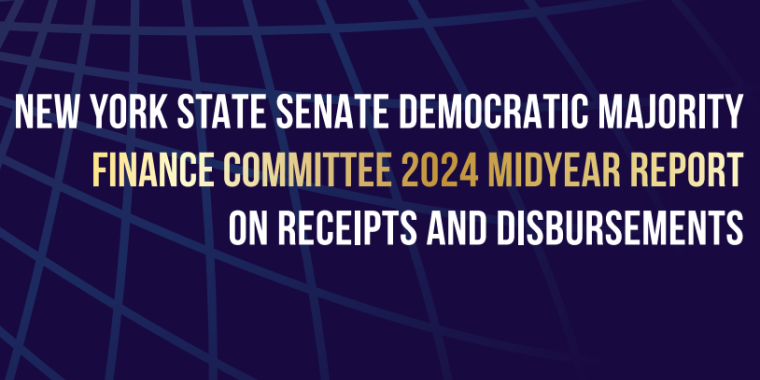
Testimony Before The New York State Division Of Housing & Community Renewal Regarding Proposed Amendement Changes Of Parts 2521.1 on August 9, 2005
Liz Krueger
July 12, 2010
My name is Liz Krueger and I represent the 26th Senate District, which includes the Upper East Side, East Midtown and Midtown areas of Manhattan. I want to thank you for providing me with this opportunity to testify on the proposed amendment changes in §2521.2 to conform the Rent Stabilization Code (RSC) with Chapter 82 changes of the Rent Stabilization Laws of 2003.
The Preferential and Legal Regulated Rent Should be Clearly Listed in All Vacancy and Renewal Leases
I urge the Division of Housing & Community Renewal (DHCR) to reconsider its proposed amendments. These changes would result in tenants getting insufficient notice of future rent increases and fail to give them adequate notice to challenge their rents in cases of overcharge. The DHCR’s current policies which are administered and set forth in Fact Sheet #40 have been the primary mechanism of implementing the changes made in 2003 in Chapter 82 of the Rent Stabilization Law. The directives outlined in DHCR’s Fact Sheet #40 provide clear guidelines and instructions to both owners and tenants that are both fair and consistent with the statue in that they require both the legal regulated rent and the preferential rent to be stated in the lease agreement and every renewal lease. This current practice is both reasonable and provides tenants with adequate notice and full disclosure of exactly what their current rent is and what their potential rent costs could be in the future. This is particularly important since the changes allowed under Chapter 82 allows an owner, at their option, to charge the higher legal regulated rent upon renewal or vacancy. The proposed amendment to §2521.2 (c) is troubling because it does not require the owner to provide the tenant with sufficient information about the legally regulated rent. It states that:
Where the amount of legal regulated rent is set forth either in a vacancy lease or renewal lease where a preferential rent is charged, the amount of the legal rent shall not be required to be set forth is any subsequent renewal of such lease, except that the rental history of the housing accommodation prior to the four year period proceeding the filing of a complaint…shall not be examined.
These changes would be particularly harmful when made in conjunction with the other proposed amendment to § 2521.2 (b) which states “that the legal regulated rent shall be previously established when a legal regulated rent was set forth neither in a vacancy lease nor a renewal lease, but is provided in an annual rent registration statement served on the tenant.” This change could be particularly harmful to tenants because it could allow landlords to fraudulently register the rent charged as preferential. Due to the fact that the changes in 2521.2 (c) would not require the owner to register both rents on the lease or any subsequent renewal lease, tenants may not be aware that the owner has listed the higher legal rent on the annual registrations. It also often the case the tenants do not receive, or were never sent, their annual rent registrations by their landlords. It is also common DHCR practice to allow owners to file late registrations which would further exacerbate an unfair situation. An owner could retroactively file multiple registrations for several years and then later claim that they fulfilled their legal obligation to the tenant in providing notice. This is a clear reversal of the agency’s policies established in Fact Sheet #40 which state that both the legal regulated and preferential rents must have been specifically established and provided for in the lease and lease renewal agreements. Again, this departure from a reasonable and fair policy which states “that registration with DHCR of the preferential rent by itself will not result in establishing the higher legal regulated rent for future usage..” This would result in an extra burden on the tenant to scrutinize both their annual rent registrations and their leases. Many tenants would not be aware of what their actual legal rents were and would be subject to sudden and often excessively high rent increases. It could also result a greater likelihood of being illegally overcharged by a landlord.
Adequate and Sufficient Public Notice Should be Given and Widely Distributed
It also concerns me that the only public notice given regarding these changes and this hearing was in the State Register. This is an obscure, largely unread state document that most of the general public is unaware of and that few tenants read. The fact that DHCR’s only listing about this hearing about these important proposed regulatory changes and amendments that could potentially impact thousands of tenants is not only short-sighted but troubling. If tenants and their elected officials are not aware of the proposed changes in the law, and the policies and procedures of state agencies, they have no opportunity to comment on them and their impact on their lives. Major changes in rent laws should be widely known and advertised in as many popular and local community newspapers as possible. One notice in the State Register two months before any public hearing does not qualify as adequate public notice in my view or that of many of my constituents.
The DHCR Should Consider Codifying Its Current Policies and Procedures
Since both of these proposed amendments to the Rent Stabilization Law would lead to an unjust situation for tenants, due to the fact that tenants rely primarily on their leases and renewal leases for accurate information about their rents, I urge the DHCR not to implement these changes. The agency should seriously consider codifying the rules and policies provided for in Fact Sheet #40 which would more suitably conform the RSC to Chapter 82 of the Laws of 2003. I believe that these clear directives and established policies are more in keeping with the spirit of the law and the Legislature’s original intent.
Share this Article or Press Release
Newsroom
Go to NewsroomQuestions and Answers about Good Cause Eviction
November 12, 2024

2024 Midyear Report on Receipts and Disbursements
November 6, 2024

Senator Krueger's Virtual Older Adult Resource Fair
November 1, 2024
